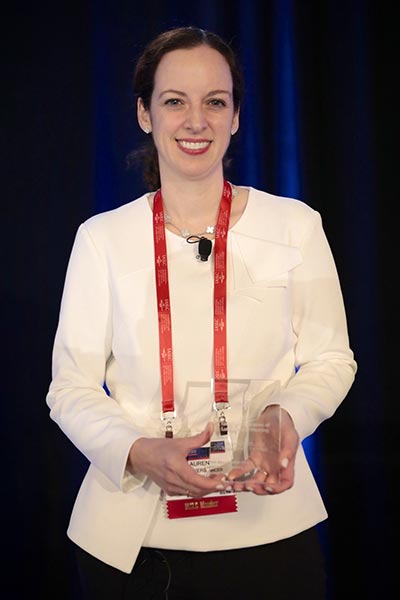
Despite the global COVID-19 pandemic, more than 15 new drugs have been approved for lung cancer treatment since 2020, including new drug classes of targeted therapies. Innovation in the field is widespread, with 226 SCLC trials open or pending activation in the ClinicalTrials.gov database.
During IASLC’s 2023 Target Therapies of Lung Cancer meeting, Lauren Byers, MD, MS, celebrated this recent progress during her opening keynote address. Dr. Byers, who is assistant professor in the Department of Thoracic/Head and Neck Medical Oncology at the University of Texas MD Anderson Cancer Center, Houston, explored exciting scientific breakthroughs in SCLC that could significantly improve patient care. This session can be viewed on-demand.
Dr. Byers said the Recalcitrant Cancer Research Act of 2012—which led to the formation of the US National Cancer Institute’s SCLC Consortium—has increased collaboration and accelerated progress in the fight against SCLC. Recent breakthroughs in treatment that enhance chemotherapy with immunotherapy have changed the standard of care and shown promising signs for improvement of SCLC patient outcomes, she said.
However, despite these numerous successes, Dr. Byers said the urgent need for continued progress remains.
“In small cell lung cancer, even though we have some advances with the addition of immunotherapy, we’re still using a one-size fits all approach,” Dr. Byers said.
She advocated for a personalized therapy regimen that implements novel treatments based on SCLC subtypes and drug-specific biomarkers to evolve past this homogenous approach to SCLC treatment. Dr. Byers cited a study she participated in that used unsupervised mRNA analysis to identify four major subtypes of SCLC, which are mainly defined by differential expression of transcription factors ASCL1, NeuroD1, POU2F3, or a low expression of all three transcription factor signatures with an inflamed gene signature (SCLC-I).1
Defining these subtypes has allowed researchers to search for and identify distinct molecular therapeutic vulnerabilities of each. When these signatures were applied to patients enrolled in the phase III randomized trial of chemotherapy with or without atezolizumab, SCLC-I had the most significant impact from immunotherapy in conjunction with chemotherapy. This finding was further validated by a subset of the 2022 Caspian study.2 Patients who received durvalumab and chemotherapy had a median overall survival rate of nearly 18 months while those who only received chemotherapy exhibited a median overall survival rate of 11 months.
“The median overall survival in the inflamed patients was 18 months with the addition of atezolizumab, whereas the patients who were inflamed but received chemotherapy without the addition of immunotherapy, the median overall survival was ten months,” Dr. Byers said.
While providers are working to leverage these insights from the clinical research phase into clinical practice, Dr. Byers said there is still a need for more research into SCLC resistance. She emphasized the necessity of including longitudinal patient samples to study subtype switching and additional analysis of the emergence of drug-tolerant persister cells.
“Small cell lung cancer is particularly good at adapting and is highly plastic, so this is an area that I’m hopeful we’ll be making more progress in over the next couple of years,” Dr. Byers said.
She closed with a message of professional solidarity, collaboration, and optimism. Dr. Byers said that international, multidisciplinary teams possess the potential to revolutionize SCLC treatment.
“We’re going to see a transformation in the coming years, and so it’ll be really exciting to be a part of that with all of you,” she said.
References
- 1. Gay CM, Stewart CA, Park EM, et al. Patterns of transcription factor programs and immune pathway activation define four major subtypes of SCLC with distinct therapeutic vulnerabilities. Cancer Cell. 2021;39(3):346-360.e7. doi:10.1016/j.ccell.2020.12.014
- 2. Paz-Ares L, Chen Y, Reinmuth N, Hotta K, Trukhin D, Statsenko G, Hochmair MJ, Özgüroğlu M, Ji JH, Garassino MC, Voitko O, Poltoratskiy A, Musso E, Havel L, Bondarenko I, Losonczy G, Conev N, Mann H, Dalvi TB, Jiang H, Goldman JW. Durvalumab, with or without tremelimumab, plus platinum-etoposide in first-line treatment of extensive-stage small-cell lung cancer: 3-year overall survival update from CASPIAN. ESMO Open. 2022 Apr;7(2):100408. doi: 10.1016/j.esmoop.2022.100408. Epub 2022 Mar 10. PMID: 35279527; PMCID: PMC9161394.





